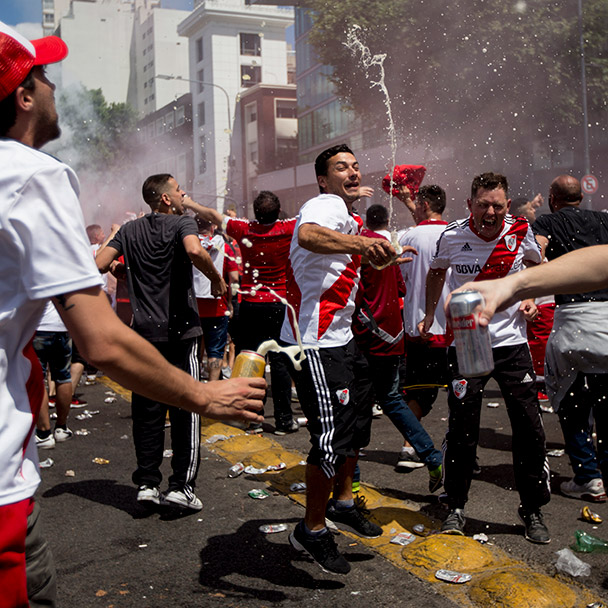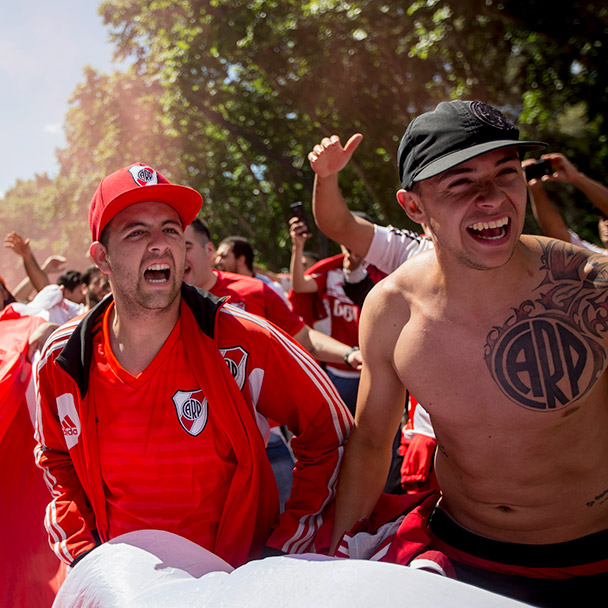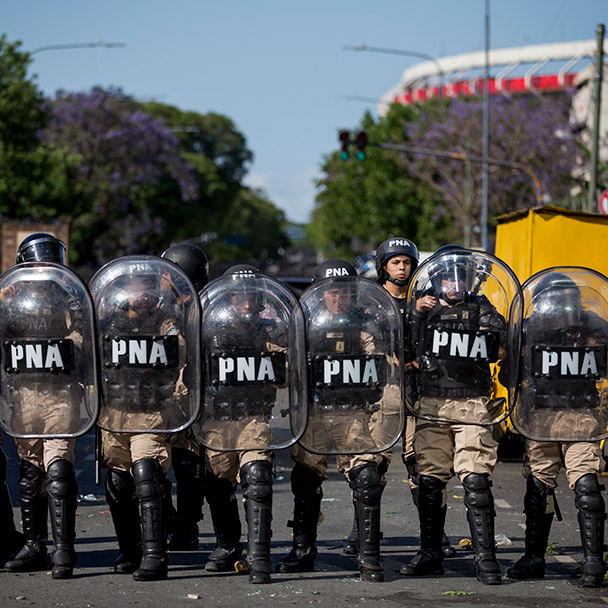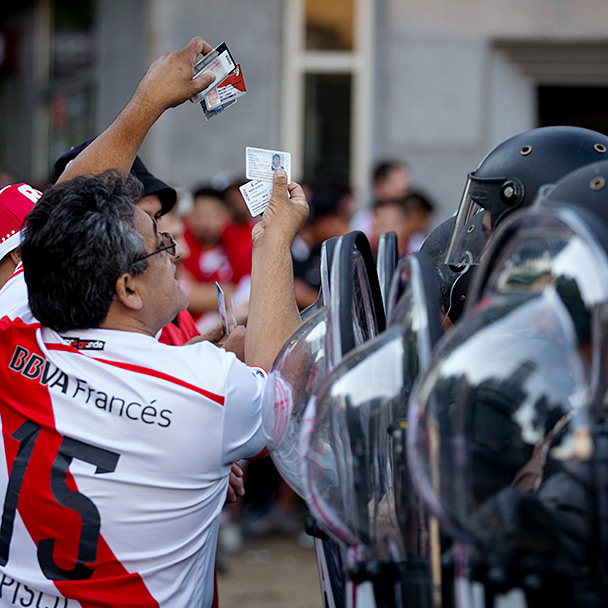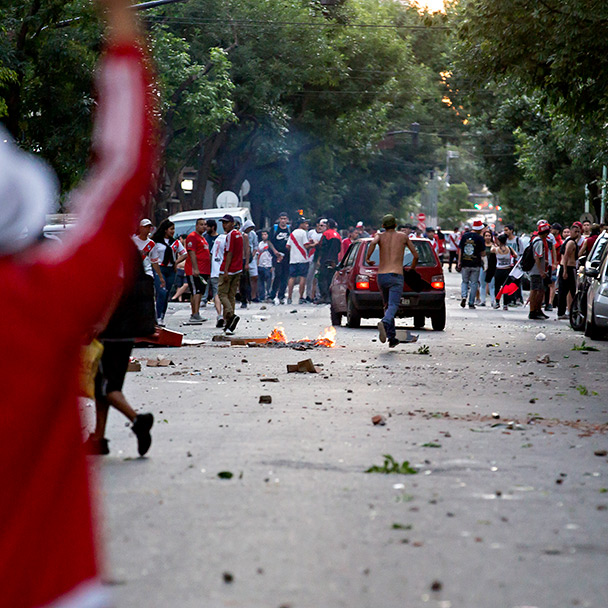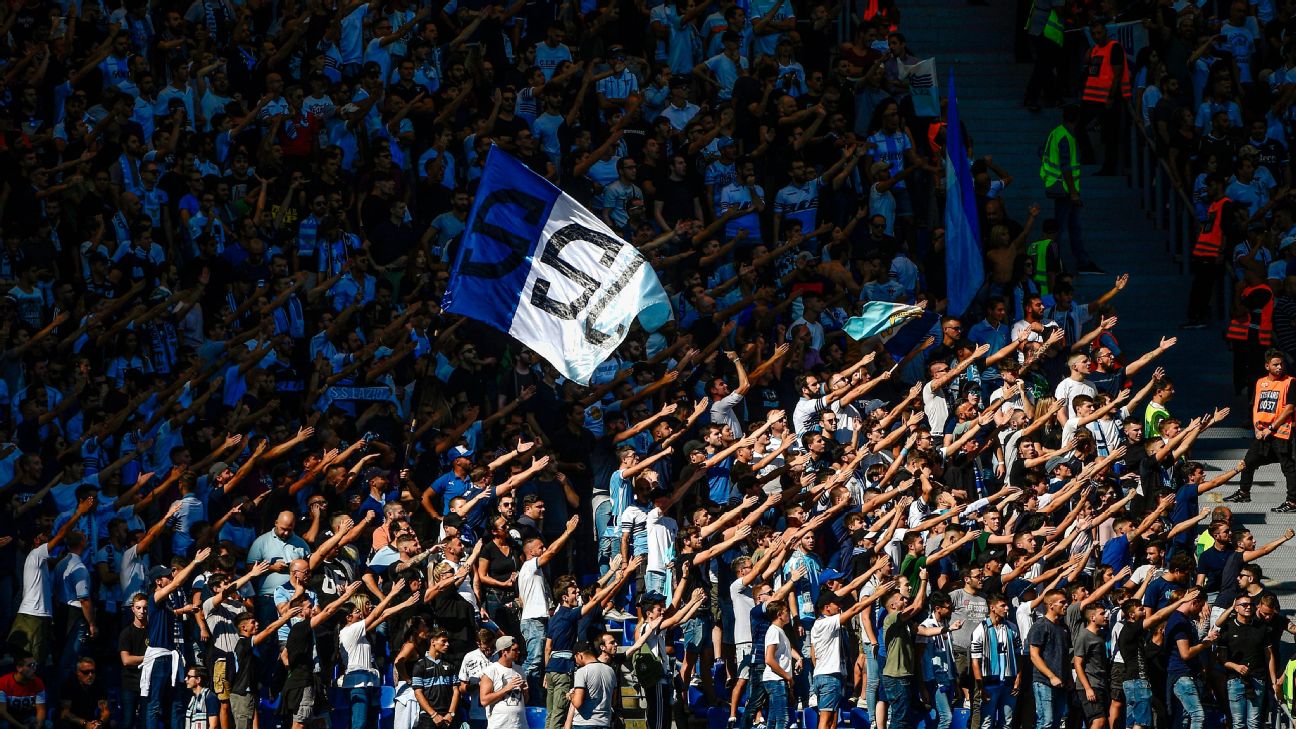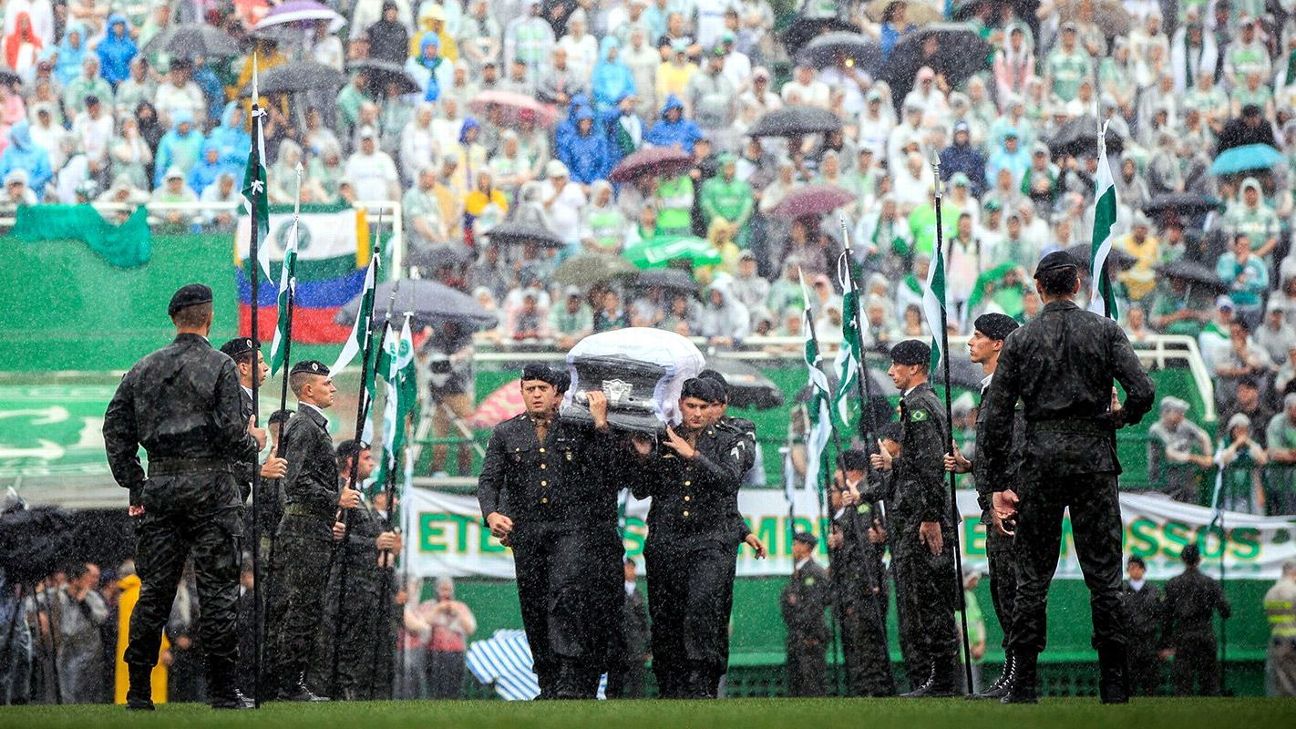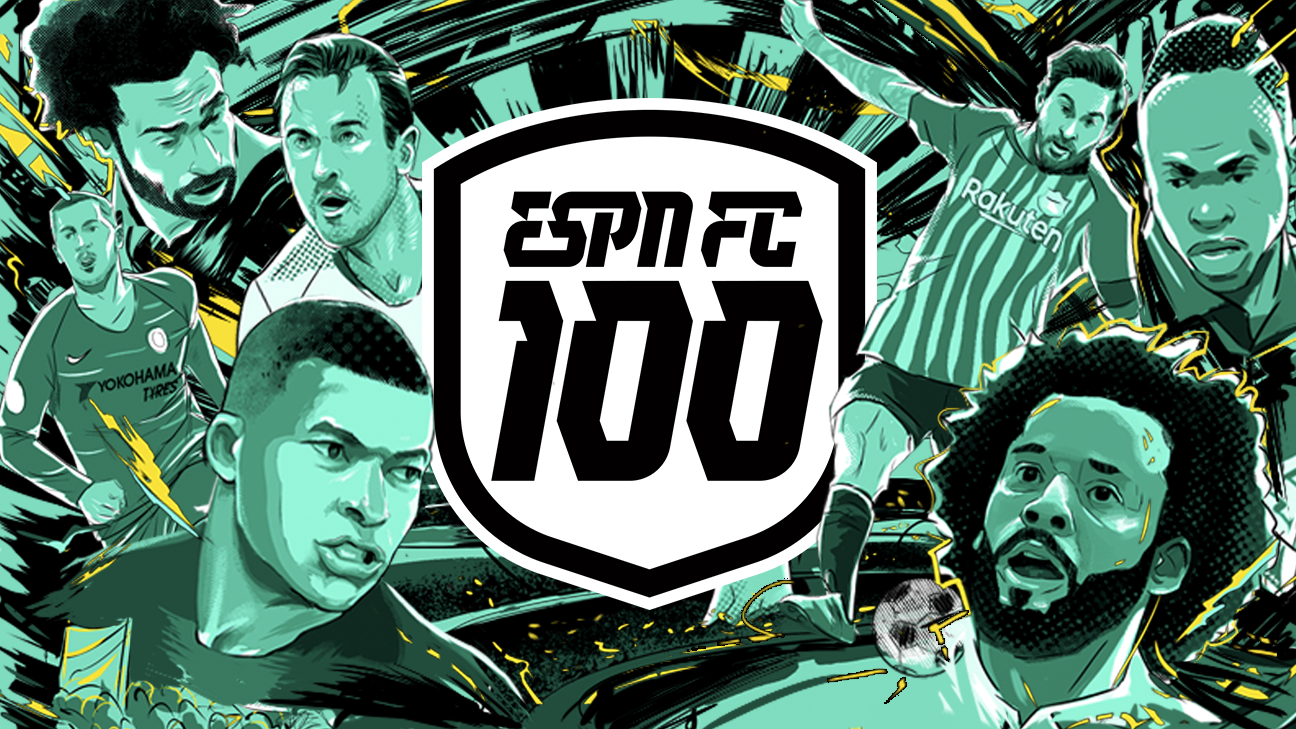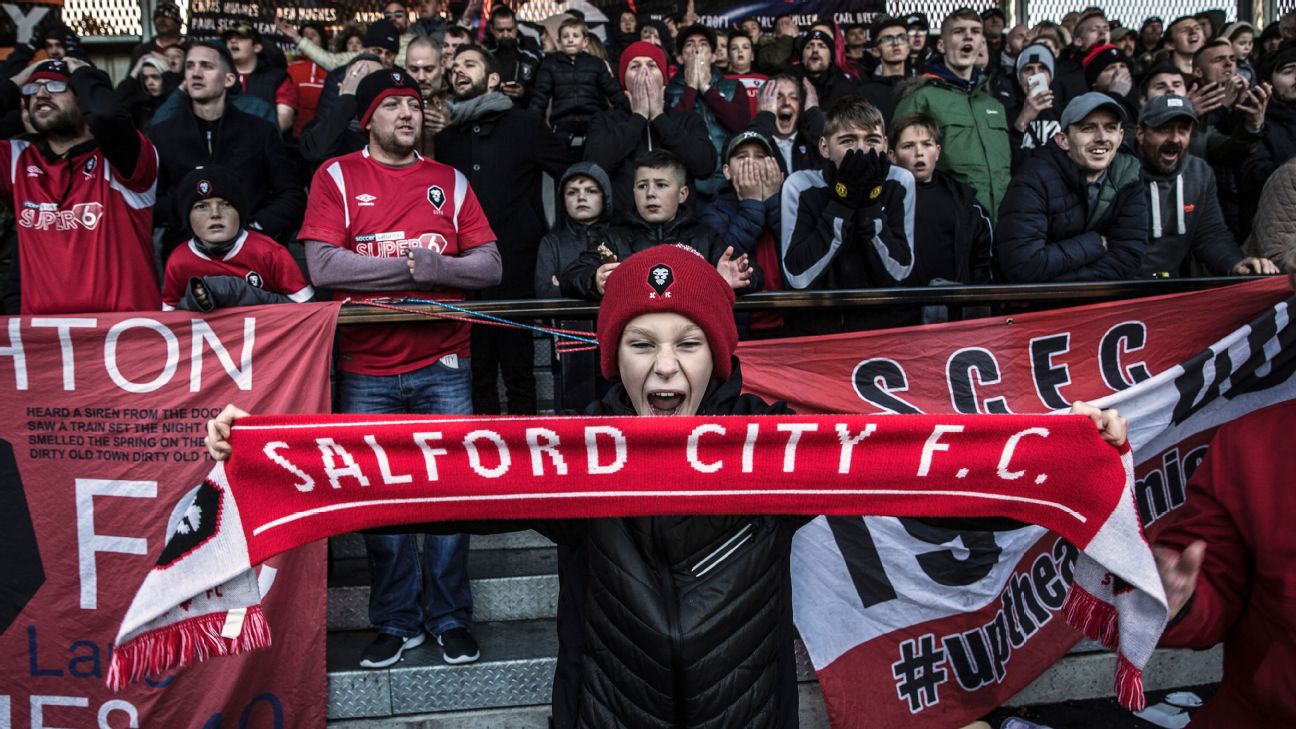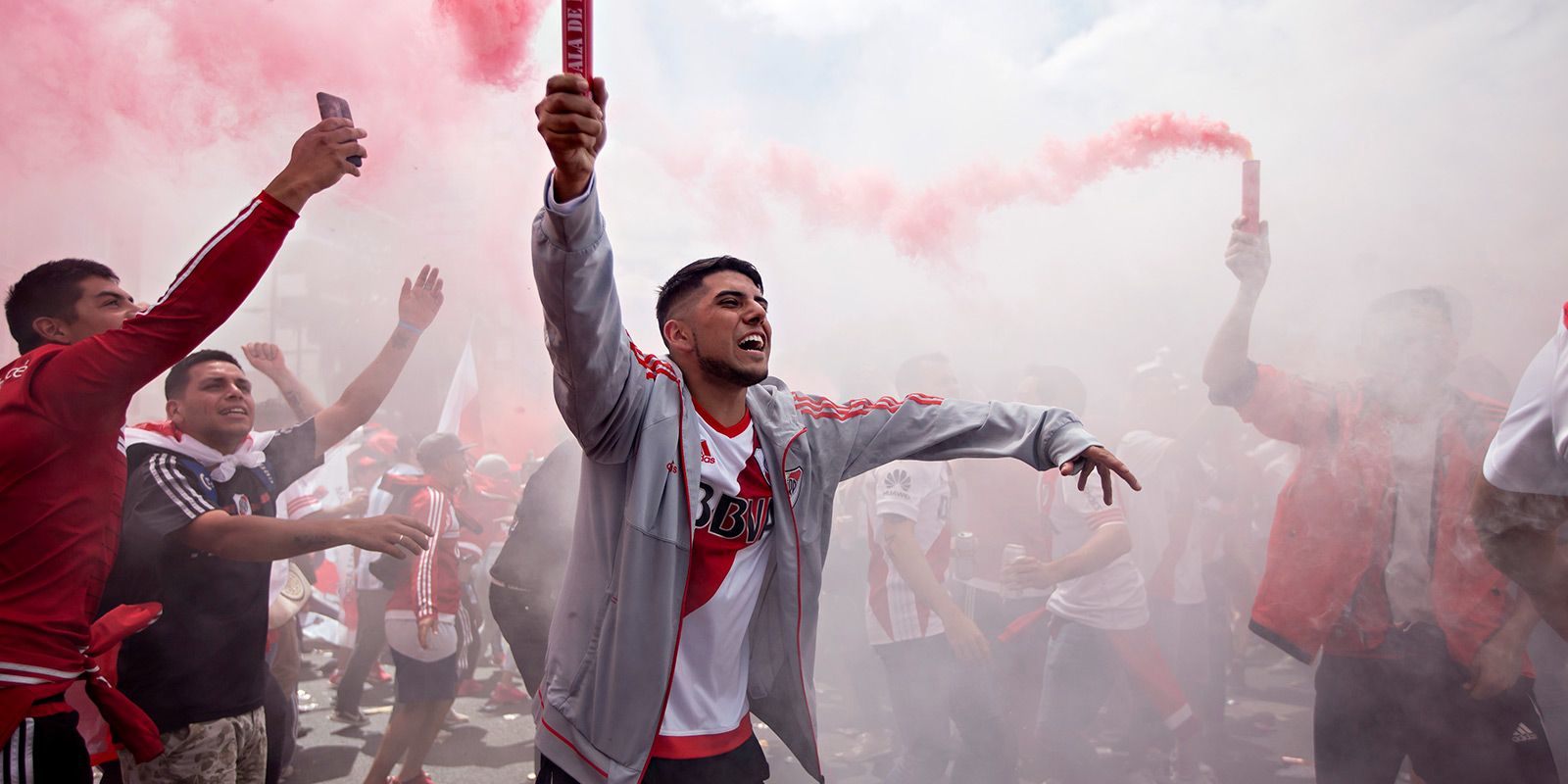
The Greatest Game Never Played
When Boca Juniors and River Plate were set to meet in Argentina's most important match ever, Buenos Aires lost its mind.
This is an ESPN FC feature.
The match was going to be one of the most tense, important sporting events ever played, the second leg of the Copa Libertadores final between Boca Juniors and River Plate. Never before had the Buenos Aires rivals played for the South American title. I couldn't believe my good fortune to be in possession of a ticket as I rode in a bus down one of the city's wide avenues towards the stadium. Because of the violence that plagues Argentina soccer, no visiting Boca fans could attend the match at River's El Monumental. We passed only fans in red and white shirts, singing River Plate songs. The streets were lined with riot cops wearing black armor. I should've paid them more attention, given the chaos that would overtake the city in the next two days. The match was two hours away and just a few blocks away, the Boca Juniors bus was trying to navigate the madness.
In the first leg at Boca's famous La Bombonera, the two teams tied 2-2, setting up one game for a title that the winning fans would brag about for generations. River supporters still sing songs about 2015 when a Boca fan leaned over the tunnel and pepper-sprayed the River team returning to the pitch after halftime. River refused to play, which led to Boca being forced to forfeit. The song lyrics call Boca supporters "cowards" and "b----es." Four years earlier, River were relegated to the B Division for the first time in their 100-plus year history and graffiti stencils of ghosts wearing the letter "B" still cover La Boca. The spray-painted ghosts infuriate River fans, who can only stare at the taunting walls and know there is nothing they can say. Fear of losing face and standing have driven an anxiety that, as strange as this sounds, was absolutely palpable in the city -- and on our bus.
Two River fans sat next to me in the last row. They talked softly to themselves, but my translator could hear.
"This could change my day so much," one said.
His friend looked at him.
"No," he replied. "My life."
He paused.
"I went to the psychologist Friday and only talked about this," he said.
“People are more afraid of losing than they are excited about winning.”
- Demian Bio, Buenos Aires reporterI landed on game day just before 7 in the morning and took a taxi to La Boca, the working-class neighborhood near the docks, once home to the Italians who shaped the culture of this city and filled and re-filled with generational waves of immigrants. It's a vibrant but rough place, hit especially hard by the financial crisis that has stripped more than half the value from the peso, destroying life savings overnight. The interest rate is around 70 percent. It's been a brutal 18 months in Argentina so when its two biggest clubs both reached the cup final, the country rejoiced at this tiny yet beautiful thing.
Wanting my own tiny beautiful thing, my translator, Tomas, and I went looking for a neighborhood joint that would serve up a choripan sandwich: just one of the many little jewels that Buenos Aires can create amid so much structural uncertainty. We found a corner parrilla with plastic sidewalk tables, all of it in the blue and yellow colors of Boca. As I slathered the bread and sausage with chimichurri from a plastic container, Tomas talked about the game.
"I remember growing up hoping for a match like this," he said.
We sat down at one of those tables and the day seemed bright and hopeful.
Then an antique green Ford Falcon drove past.
I'm not sure how to explain the bad feelings that make, model and color evokes in Portenos but I'll try. In the 1970s and '80s, Argentina was ruled by a military dictatorship. They kidnapped enemies -- some of whom were guilty of, say, having the wrong books on their bookshelves -- and then tortured and killed them. At one concentration camp run by the Navy -- within earshot of where today's match would be played -- the guards raped people with cattle prods, took the prisoners up in airplanes and threw them alive into the river and ocean. Their broken bodies washed up on shore.
The cars used by the police to kidnap these people, often the last place they were ever seen, were green Ford Falcons. It's enough of a symbol that the emotional centerpiece of the national memorial and museum is an artist's deconstruction of a Falcon. It's the automotive embodiment of the nation's most shameful moment and a reminder that not so long ago civilization collapsed.
When the car drove past we both did an actual double take.
"Was that a green Ford Falcon?" I asked, stunned.
"More olive?" Tomas said, hoping to absolve the driver from bad taste or worse.
This is a good window into how the past hovers around daily life. I've reported in Argentina many times and what follows is an outsider's simplified, yet informed, view: There are many secret and conflicting histories in a society with little shared ground on which to build a tribe. You can read endless books about how Argentina went from a promising economy -- the 10th wealthiest in the world in 1913 -- to the economic joke it has become in the 105 years since, defaulting eight times on its debts and often suffering double digit annual inflation.
Much of this lies at the feet of the country's politics, which are toxic and largely based on cults of personality and savior mythology. Juan Peron, the father of the Peronist movement that still holds sway in modern Argentina, favored power over any code or rigid ideology. Right or left didn't matter; he made nice with Fidel Castro
His opponents share blame, too, for fighting on the battlefield he created. There is a phrase being used right now in Argentina: "la grieta," which means "the crack", referring to the split in the national dialogue that happened when Peron emerged. There was nothing to be for or against, since all sides insisted their opponents were liars and thieves.
Even today, the extremists set the agenda. Some left-wing citizens don't believe their country can't afford the social programs that contribute to all these defaults. Their theology blames international corporations and the dark hand of conspiracy. Meanwhile, some right-wing citizens still don't believe the dictatorship's murders happened, or that the atrocities were exaggerated or even necessary; the dead were terrorists, if there were any dead at all. The average citizen is trapped in the middle. It is a politics founded on such sweeping lies that there doesn't seem to be a way out of a tangle a century in the making. Argentina's wounds are largely self-inflicted -- by politicians, yes, but also by voters who believe their side holds a monopoly on truth and that vast plots are responsible for their misery instead of their own misplaced belief in saviors.
It's no coincidence that Argentina has the highest per capita rate of mental health doctors in the world.
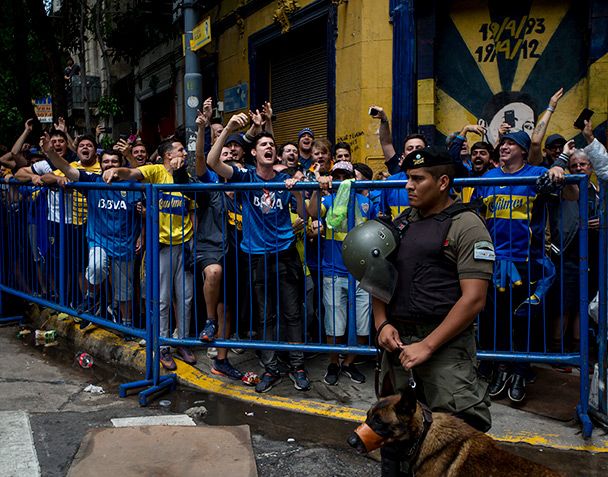
Boca Juniors fans congregate before the first leg of the Copa Libertadores final against River Plate. Boca and River would draw 2-2 at La Bombonera, setting the stage for a critical second leg that Buenos Aires ultimately couldn't handle. Maria Amasanti
THE CURRENT PRESIDENT OF Argentina, Mauricio Macri, who was elected in 2015, sold himself as the solution to all those years of dueling histories and stagnation.
His buzzword during the campaign was "normal." He wanted to create a normal country with normal politics and normal economic policy. Instead, he has had to secure yet another bailout from the IMF while trying to cut the social programs that are as beloved as they are fiscal ponies.
This has cost him. Just blocks from where Tomas and I sat at the corner restaurant, alongside graffiti of the ghost with the "B" on its chest, were the letters: MMLPQTP. It means, "Mauricio Macri the whore that birthed you." Voters chant it at sporting events and even at a recent Roger Waters concert. On the same wall is a spray-painted interlocking V and P, which means "Peron Returns."
When this Boca-River final was set, Macri tweeted that he wanted it to be a "normal" sporting event complete with visiting fans, like the ones in the United States or Europe. The same day as his tweet, government security officials told reporters with a rhetorical sigh that such a game was impossible. His dream didn't even survive a day. Not only is Macri unable to repair a country's economy and politics, but he can't even make a stadium safe enough for two groups of citizens to cheer.
We made our way towards the stadium, stopping in the wealthy Belgrano neighborhood at a coffee shop to meet with a local political reporter. Demian Bio is focused mostly on the G-20 summit, which was starting in three days.
Until recently, he was a River fan and club member.
"I'm disillusioned with Argentine football," Demian said, "especially since how intertwined with politics it is."
Macri got his start as a popular and successful president of Boca.
The current president of Boca is a powerful lobbyist.
The father and son who control Independiente also control the teamsters' union.
"Everyone, sooner or later, becomes involved in politics," Demian said. "The president of River is definitely going to take the leap. You can't separate them."
He doesn't believe the city is prepared for all these world leaders. What had seemed two years ago like a victory lap for Macri is now a metaphor for his failure. "It was supposed to mark Argentina's return to the world stage after 12 years of isolation," Demian said.
He summed up the truth at the heart of all this football tension.
"People are more afraid of losing," he said, "than they are excited about winning."
More than 50,000 fans went to support Boca Juniors during an open training session in La Bombonera on Nov. 22, 2018. Thousands of more fans were left outside after authorities had to close down the stadium due to the amount of people. Maria Amasanti
OUR BUS PULLED INTO a parking lot across from the stadium.
I paid $2,000 for a ticket that bore someone else's name and ID number. The passes weren't transferrable so we had guides to grease us through the three or four layers of police and security without anyone asking for our identification. One security guard stopped me and looked at my ticket, which belonged to a man named Rafael, and as he started asking questions, one of the guides snatched the ticket from the guard, handed it back to me and said, urgently and forcefully, "Vamos!"
There's nothing that feels quite like being in a city before a big game. For the past several days, some of the heaviest hitters in the soccer-writing world had been documenting the building energy. I especially loved the opening to Rory Smith's New York Times advance because he interviewed the broadcaster who'd been tasked with a radio station's "zen broadcast" to try to limit the cardiac events an important Superclasico can cause. He talked in a soft and patient voice and in the place of the singing, chanting crowd noise was quiet music.
The local papers were full of stories that showed and amplified the importance: a murder linked to the match, two friends who got in an argument that ended in one burning down the other one's house. These examples are so extreme that they actually obscure how deeply the rivalry is felt for the citizens of Argentina. The truth is difficult to understand and even more difficult to describe because it is tied up with all those hopes and insecurities. The teams are often described as rich and poor -- River's fans are nicknamed "millionaires" and Boca"s fans are often painted as lower class -- but that's just a window into the deep tribal need to self-identify. Really rich people in Argentina like polo. The two groups of fans are the exact same people, which is obviously why they dislike each other so much. It's self-loathing disguised as fandom.
The SuperClasico's power lives most visibly in the tiny moments.
We lined up, an entire street packed with people, surrounded by cops.
The first surge of the crowd brought with it a sense of power.
A riot cop buckled a chin-strap with a tiny, plastic click.
The street was blocked by a series of metal barricades, each with an opening narrower than the street itself, manned by officers and private security contractors. On each side of the street, the riot cops pushed the crowd together, creating chaos and physically forcing people into a dangerous bottleneck. There was no communication so sometimes a checkpoint behind you would open before the checkpoint in front of you, leading to a wall of fans pressing into the back of an already anxious and squeezed mass of people. The father next to me leaned down and whispered to his scared 9-year-old son, "Tranquillo. Tranquillo."
Pepper spray from a nearby police battle filtered through the air.
We pulled our shirts up over our noses.
Fans without tickets sometimes made a run for it trying to break through the checkpoint, so the riot cops chased them around, adding to the chaos.
After about an hour, we made it inside.
The packed crowd sang a River anthem. Behind me stood a father and a son. The son sang as loud as he could sing, maybe as loud as he'd ever sung before. The father kept quiet, his eyes filling with tears. The boy understood and put his arm around his father's shoulders and sang for both of them.
The air smelled like coffee breath, aftershave and marijuana smoke.
Kickoff was scheduled for 5 p.m., but the players never came out to warm up. After one AC/DC song, the pump-up music stopped. None of the pregame pomp started and everyone sat down and talked quietly, the tension nearly unbearable. Cell phone service was spotty. I didn't know what was happening.
Around 4:45, a voice echoing through tinny speakers announced that the game would begin at 6. People cheered. The crowd sang song after song, and this time the dad behind me joined in.
Boca trainers set up cones for warmups.
The officials came onto the pitch.
Then the PA man said the match would start at 7:30.
People whistled but felt hopeful that a game would happen here today.
They'd waited a lifetime for this match-up in this game and had been given the gift of a 2-2 tie in the first leg, ratcheting up the tension and meaning, and although my five words of Spanish and my neighbors five words of English meant we couldn't talk, the worry was written all over their faces. People shrugged and grimaced, knowing that somewhere out of sight, politicians were deciding what should be decided on this field. Until the end, I believed that the teams would run out of the tunnel and a whistle would blow and the cup would be won. Some fans clearly believed, too.
Fans threw flares onto the track ringing the pitch and smoke rolled across the grass.
The stereo played "You Shook Me All Night Long" and "Eye of the Tiger." At 10 minutes to 7, a plane on final descent to the nearby airport flew low over the stadium and tipped its wings in salute. One little boy nearby, crushed by the wait, slept in his dad's arms, head on his shoulder.
At 7:20, to whistles and shell-shocked faces, the match was suspended until 5 p.m. the following day. No reason was given inside the stadium but the news was now spreading. The terrible year had, improbably, grown worse. The Boca Juniors bus had been attacked with rocks and then accidentally pepper sprayed by the cops who were tasked with protecting them.
Those of us exiting into the street didn't know what had been happening outside and beneath the stadium. The carpet of broken glass and spent shotgun shells offered some clues. People watching on television knew much more than anyone within a dozen blocks of the pitch. Hours earlier as I stood in line, the Boca bus rode through the city towards the stadium. The police didn't close the streets down and then took the motorcade towards Monroe Street, which even casual fans know is always packed with rabid River fans on game days. "When we got past the roundabout it felt like an army was waiting for us," the bus driver said in an interview with local journalists. "For me, we were set up. We were going to a football game, not to war."
The fans began throwing rocks and bottles at the bus, eventually shattering the windows and sending glass shrapnel flying in the cabin, some hitting team captain Pablo Perez in the eye. The police's pepper spray made the situation worse. The bus driver fainted and the team's vice president had to take the wheel. Eventually the team made it to safety and the players poured off the bus in visible distress, coughing and red-faced. Perez went to a local hospital and returned with his eye covered in a bandage.
Outside, fans with tickets couldn't get through the security. Others rushed the barricades, with several young men flying into them with karate kicks until the gates swung open and a crowd rushed towards the stadium. Nearby a group of fans threw rocks at the riot cops who opened up with rubber slugs and gas. In the chaos, one police officer named Julio Apriles did something brave, stupid and absolutely critical.
He walked alone into the no man's land between rock-throwing River fans and the riot-gear clad police. He didn't wear a helmet or body armor, just a red golf shirt. He didn't carry a weapon. The shock of seeing him stopped the rock throwing.
He spoke with the fans and defused the anger.
"Kids these days," is literally what he said afterwards.
His daughter was watching on television and soon his phone buzzed.
It was his wife.
She started with three sad face, crying emojis and pleaded with him to be safe.
"Martu is crying," his wife wrote. "Send an audio to tell her you're fine."
The headline of Miguel Delaney's The Independent story called the politics that played out in the bowels of the stadium over the next two hours "shameful." His report documented the back-and-forth negotiations beneath the feet of all of us who came to watch one of the most important matches ever.
The broadcasters, Fox Sports, pressured Boca to play, he reported, along with all the involved authorities: CONMEBOL, FIFA and the Argentine government. A CONMEBOL doctor said there was no medical reason to postpone the match so Boca released photos of its captain with an eye-bandage. Carlos Tevez, the heart and soul of the team, went on television to say that he and his brothers were being forced to play. Eventually both clubs agreed that no match could be played, which is when the final announcement came and we all left the stadium.
Standing on the street, I took in the scene, picking up some of the spent .12/70 caliber shotgun shells that had launched rubber slugs into the crowds. They take skin off in perfect circles. Other cops shot paintballs or pepper spray, and still others fired what can best be described as flash-bang grenades. The glass cracked underfoot and a broken tree limb lay in the middle of a city street. A man wandered the crowd looking for someone -- a woman, a child, a dog? -- calling out, "Princess? Princess?"
Tomas and I walked away from the crowds and finally got a taxi toward Palermo, the neighborhood where he lives. We found a bar and ordered two cold beers. The stereo played that really annoying Justin Timberlake song from last summer, or two summers ago, which made the whole thing feel like a Tarantino movie: the peppy music and the empty shotgun shells in my pocket, and Tomas and I looking at the pictures on the back of his camera of riot cops and River Plate fans in a Wild West standoff in the middle of a street. I drank my beer quickly and ordered another. On the wall, the television played live news coverage of the Boca team still on the pitch, unable to leave the stadium. It was now 8:45 at night.
We watched Tevez talk to a reporter, reading the quotes on the crawl.
He blamed River Plate and their political connections.
"River has always done whatever they wanted," he said. "If this happened in Boca, the Cup would have been River's."
River Plate fans waited for the doors to open at the Monumental ahead of the second leg, Nov. 25. Yet the attack on Boca Juniors' bus meant that they'd be turned away. Maria Amasanti
THE NEXT MORNING, TOMAS and I went to the Boca team hotel to be there for that gladiatorial moment when the players left their rooms and moved through the calm safety of a luxed-out lobby and onto the bus to once again ride into the chaos. Rarely has a sports team been given such a gift: Lose and they had a built-in excuse but if they managed to win? They'd be warrior folk heroes forever in this city, the kinds of men whose images would be spray-painted on slum walls long after their careers came to an end.
Police stood watch at metal barricades that walled in the hotel's entrance and circle drive. Fans crowded both entrances, two or so dozen on the left side, and at least 10 times that many on the right (which just happened to be the direction the television cameras were pointed). When a photographer approached the mob, it got louder. Vendors walked the crowd with tall boys in those red plastic stadium trays held in the air, and a woman sold cocktails of Fernet-Branca and Coca-Cola. Fans held signs asking for the resignation of the Boca president -- they were mad he'd agreed to play the game, for some reason -- and they chanted his name and "the whore who gave birth to you."
Inside, Tomas and I got coffees and found a table. We could hear the familiar songs and the drumbeat made by fists pounding on the metal barricades. Televisions at the bar showed the scene from outside this hotel, and the scene from the stadium, where fans waited to go inside, and a shot of the riot cops holding shields. Tomas showed me a guy he photographed the day before who'd given an interview that had gone viral overnight. "The only thing I want to say is 'Go River,'" the man said. "But to Boca fans, sorry for what happened to you. I, like all River fans, have a Boca fan as a brother and I love my brother. Let's all learn a little civilization from this. Politics and religion don't matter. Nothing matters as long as we're civilized."
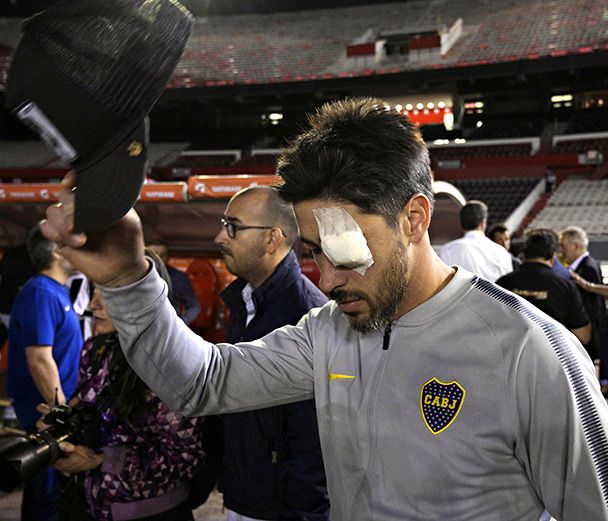
Boca Juniors' captain, Pablo Perez, was treated after the bus attack for an eye injury. The Boca squad was affected by smoke inhalation and broken glass, prompting the second leg's suspension and eventual relocation. Juan Mabromata/AFP/Getty Images
It was just before noon.
The team trainers told us that the bus was scheduled to leave at 2:40 for the scheduled 5 p.m. kickoff.
Everything seemed normal.
Men in team tracksuits went downstairs to a private breakfast area. Security prowled the lobby and set up ropes leading from the elevator to a side entrance/exit.
The first time I realized something was wrong was when a Boca media guy met with reporters on the steps of the hotel and said the team didn't want to play. They wanted to just be awarded the title.
Fans lit blue flares and threw them over the barricades.
Across town, River Plate officials opened the gates and fans began pouring into the stadium. They were subdued and anxious. They didn't sing. At the Boca hotel the motorcycle escorts arrived, the cops wearing armor and revving their engines. Soon the bus pulled up and the driver got off, wearing a black tie and a wry smile.
Then the Boca media people called a rushed news conference and the camera people ran into the hotel, trails of wire running from the cameras to satellites broadcasting all of this life to a nation huddled around television sets.
That's when I knew.
Veterans of Argentine football might have known hours earlier, but I'm an outsider, and I thought only a fool would not go play this game. Take military helicopters. Do whatever it takes. Show up. It's as if nobody inside Boca leadership could get over their victimhood long enough to see the moment clearly. They were so busy howling about unfairness that they couldn't seize this chance for sporting immortality. It was all such a waste.
Officials then announced that the match had been postponed and the lawyers stepped into the breach, where they'd battle this out in the coming weeks before settling on Madrid as the site for the final, after throwing around ideas such as Paraguay and Miami.
The River fans left the stadium.
At exactly 2:56 p.m., the Boca Juniors bus pulled out of the hotel empty. Tomas and I looked at each other and left, too. A block away, we could see how small the crowd of fans manning the barricades actually was. A few hundred people, tops. The beauty of this perfect Buenos Aires Sunday afternoon became clear. We stood outside an American-style diner. The speakers played Creedence Clearwater Revival's "Who'll Stop the Rain?" We got in a taxi. Couples sunbathed in a park by the river. Families and couples huddled under the shade of umbrellas. They ate picnics and pushed kids on swings. Old men sat in chairs with their shirts off. We saw a few Boca jerseys and a few River jerseys.
The taxi dropped us at El Cuartito, a local pizza place I've grown to love. It's painted in the colors of the Argentina football jersey and is popular with old men, cab drivers and children -- the trifecta! We sat down at an open table and I looked towards the window. The first table was three young men wearing Boca jerseys, and one table up was a family wearing River jerseys. They all ate pizza and laughed and nobody threw anything or even looked sideways at their opponents, and I couldn't for the life of me tell who controlled Argentina: the majority who just wanted to live in a normal country, or the mob who threw rocks at busses and bent an entire nation to their will.

